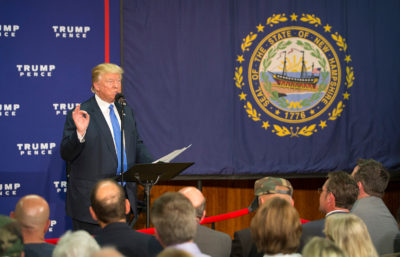
Three Boston University economists simulated the Republican Party’s pending tax plan and have concluded that it would have a positive impact on the U.S economy.
Their Oct. 17 report, titled “Simulating the Republican ‘Unified Framework’ Tax Plan,” projects the White House’s tax reform strategy will raise the country’s GDP between 3 and 5 percent as well as real wages, which are adjusted for inflation, between 4 and 7 percent. These increases translate to be about $3,500 annually for the average household.
This conclusion stems from United Framework’s plan to cut the country’s corporate tax rate from 34.6 percent to 18.6 percent, according to the study.
Laurence Kotlikoff, a BU economics professor and one of the study’s authors, said the simulation determined that the Republican tax plan “should provide more tools for U.S. workers to work with, make them more productive, raise their wages and also raise their tax payments as a result.”
Kotlikoff said he and his co-authors, Seth Benzell, a BU postdoctoral associate, and Guillermo Lagarda, a BU research fellow, were motivated to conduct the study because they thought other analyses of the tax plan were “substandard” and “off-base.” The authors opted to use a unique model called the Global Gaidar Model, which incorporates data from the global capital market.
“I believe we have the best model around to study this particular reform,” Kotlikoff said. “[The model] is not complicated, but it’s detailed for an economic simulation model, and we worked on it for about three years to get it as close as possible to the real world.”
According to Benzell, the simulation only factored in the proposed changes to corporate taxation, even though the “Unified Framework” plan also includes changes to personal income taxes.
Although the current state and federal corporate tax rates are very high, Benzell said they collect very little in revenues due to the high number of loopholes and deductions businesses use to avoid paying corporate taxes.
“In our simulations, we suppose that both the corporate tax rate and the amount of loopholes are cut by half,” Benzell wrote in an email. “We think cutting the corporate tax rate roughly in half would boost U.S. capital stocks by 10 to 20 percent. A country makes stuff by combining capital with labor, so more capital should boost labor productivity, wages and GDP.”
The study was not a partisan effort, Kotlikoff explained, but an attempt to independently assess the proposed policy’s impact on the U.S. economy.
“This is our best projection of what will happen,” he said. “I’m not oriented towards any political group. I’m more oriented to try to figure out what policies are going to help our country as a whole.”
Although the Republican tax plan has flaws, Kotlikoff said, he believes the plan should be passed in Congress, and he is hopeful his study might play a role in the debate over tax reform.
“It might have some influence because it’s been widely disseminated,” he said. “I heard that Ivanka Trump tweeted it out today. Relative to nothing, just keeping the status quo, it should be passed in my view. We need to try something that makes some sense and the model seems to think it makes sense and it will do some amount of good.”
Several students in the Questrom School of Business said they are interested to see whether the BU study will impact the tax proposal’s passage in Congress.
Anthony Salerno, a Questrom senior, said his perception of the Republican Party leads him to believe the proposed tax plan will mostly benefit upper-income groups.
“Judging from the track record of the GOP, [the tax plan] will probably just help the wealthy,” Salerno said. “I think there’s a lot of things we can do to the tax code for lower-income people. I just don’t think it’s realistic from this administration.”
Julia Hunt, a sophomore in Questrom, said she appreciated that even though BU is a liberal-leaning campus, its researchers are still open to publishing studies that endorse Republican policies.
“It’s interesting that they think it’ll have a positive impact on the U.S. economy, even though it’s a Republican plan” she said. “It’s cool that our college has been the center of all of these relevant studies recently.”
Hannah Maurer, a Questrom senior, said studies conducted by Boston University professors makes her proud to attend BU.
“I love reading papers like this that are written by professors that I’m currently taking classes in,” she said. “It’s really inspiring and motivating. In terms of being at BU specifically … it makes me proud because professors have the passion to write these amazing pieces and do all this work.”
























































































































Carly Rittenhouse • Oct 25, 2017 at 3:25 pm
Talking about how much this tax-plan would help people based off of “the average househould” metric you use is farcicle – If I’m in a group of 10 people and I have 10 dollars but they all have 0, the average income would be $1. Obviously stupid.